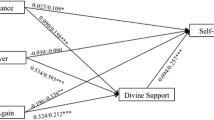Abstract
Our discussion begins with a consideration of the various types of religion and of guilt. Both religion and morality function in different ways from individual to individual. All these factors need to be taken into account before we can turn to treatment for the painful experience of guilt and bring about an improved self-esteem.
Similar content being viewed by others
References
Dahle, J., and Johnshoy, M.,The Liturgical Service of the Lutheran Church. Minneapolis, Augsburg Publishing House, 1922, p. 3.
Ibid., p. 34.
This theme appears many times in Baker's two autobiographies:Growing Up. New York, New American Library, 1982, andGood Times. New York, Penguin Books, 1989.
Carnegie, D.,How to Win Friends and Influence People. New York, Simon and Schuster, 1936 (over fifteen million copies); Peale, N. V.,The Power of Positive Thinking. Englewood Cliffs, New Jersey, Prentice-Hall, 1958; and Schuller, R.,Peace of Mind Through Possibility Thinking. New York, Jove Publications, 1978, andBe Happy You Are Loved. Nashville, Tennessee, T. Nelson, 1986.
“Levels of Responsibility” is briefly discussed in the author's article, “Guilt,” inCounseling and Values, 1985,29, 2, April, 134–135. See also Carroll, J., “Definitions, Symptoms and Shame.” InGUILT: The Grey Eminence Behind Character, History and Culture. London, Routledge & Keegan Paul, 1985, chapter 2.
O. Hobart Mowrer, late Professor of Psychology at the University of Illinois, developed a reinterpretation of the role of morality in mental health in two books:The Crisis in Psychiatry and Religion. Princeton, New Jersey, D. Van Nostrand Co., 1961, andThe New Group Therapy. Princeton, New Jersey, D. Van Nostrand Co., 1964.
Belgum, D.,Religion and Personality in the Spiral of Life (enlarged edition). Lanham, Maryland, University Press of America, Inc., 1988, p. viii.
Allport, G. W.,The Person in Psychology. Boston, Massachusetts, Beacon Press, 1968, p. 131ff.
Ibid., p. 131–132.
Ibid., p. 132.
Author information
Authors and Affiliations
Rights and permissions
About this article
Cite this article
Belgum, D. Guilt and/or self-esteem as consequences of religion. J Relig Health 31, 73–85 (1992). https://doi.org/10.1007/BF00986846
Issue Date:
DOI: https://doi.org/10.1007/BF00986846




